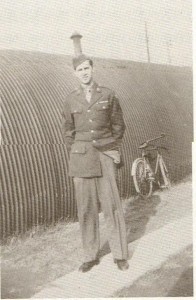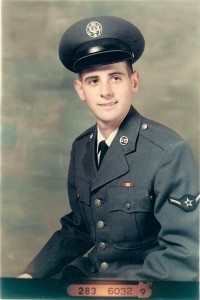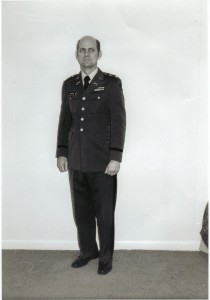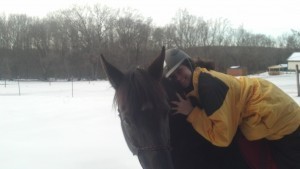Jennifer Becton's Blog, page 21
November 11, 2014
Dyslexie: A New Dyslexia-friendly Font
Designed to make reading clearer and more enjoyable for dyslexics, Dyslexie uses heavy base lines, alternating stick and tail lengths, larger openings, and semicursive slants to ensure that each character has a unique and more easily recognizable form.

Courtesy of Christian Boer

Courtesy of Christian Boer
Once installed, dyslexic readers can use the font to type, print documents, read email, or browse the Web. Read more here.
Available for a free download here!
The post Dyslexie: A New Dyslexia-friendly Font appeared first on Becton Literary.
On Veterans Day

Robert E. Whiteley
Robert E. Whiteley, my grandfather, was inducted in the US Army in 1941, just 19 days after he married my grandmother. Even though he had never fired a gun, he received the Expert medal on the 300-yard rifle range. He was then transferred to the US Army Air Corps (now the US Air Force) where he served in the Operations section of the 3rd scouting force, the Fighting Scouts, during World War II. He was stationed in the European theater and was discharged in 1945.

Robert B. Whiteley
Robert B. Whiteley, my father, also served in the Air Force. He enlisted in 1969 after graduating from Sam Houston State College and served in the accounting department of the mortuary, which was where he met my mother. (Romantic, huh?) In August 1971, he was transferred to Tan Son Nhut Air Force Base, Republic of Vietnam, where he served until 1972. He was discharged in 1973 and received numerous awards and citations.

Ed Becton
Ed Becton, my father-in-law, participated in ROTC at Savannah High School and the University of Georgia and entered the US Army as a 2nd lieutenant. He was company commander at Ft. Jackson, SC, where he led a basic training company. He joined the US Army Reserves, where he taught at the Command and General Staff College and Officer Advance Courses for 12 years. During Vietnam, his aerial delivery company was held in reserve in case the Russians attacked Europe. He retired from the US Army Reserves as a lieutenant colonel (just two ranks before the generals).
Thank you all for your service. I love you all, and I miss you, Grandpa.
*A version of this post was originally published for July 4, 2011.
The post On Veterans Day appeared first on Becton Literary.
November 10, 2014
Women Dominate Indie Publishing
The post Women Dominate Indie Publishing appeared first on Becton Literary.
November 6, 2014
Jane Says: Mary Bennet
It’s fascinating how many different works of Pride and Prejudice fan fiction have been created, from movies to books to musicals. Because of the massive amount of artistic license taken in fan fiction, it’s easy to lose sight of what Jane Austen actually said about each character in the book.
What did Jane Austen really say about Mary Bennet? First, take the quiz to out how well you know Mary. Then, read the following post to see what Jane Austen said about her.
Quizzes by Quibblo.com
(All quotations for this series will be taken from the Pride and Prejudice hypertext at Pemberley.com, which is a wonderful resource for all Janeites.)
[Elizabeth Bennet's] performance was pleasing, though by no means capital. After a song or two, and before she could reply to the entreaties of several that she would sing again, she was eagerly succeeded at the instrument by her sister Mary, who having, in consequence of being the only plain one in the family, worked hard for knowledge and accomplishments, was always impatient for display.
Mary had neither genius nor taste; and though vanity had given her application, it had given her likewise a pedantic air and conceited manner, which would have injured a higher degree of excellence than she had reached. Elizabeth, easy and unaffected, had been listened to with much more pleasure, though not playing half so well; and Mary, at the end of a long concerto, was glad to purchase praise and gratitude by Scotch and Irish airs, at the request of her younger sisters, who, with some of the Lucases and two or three officers, joined eagerly in dancing at one end of the room (P&P, vol. 1, ch. 6)….
At length however Mrs. Bennet had no more to say; and Lady Lucas, who had been long yawning at the repetition of delights which she saw no likelihood of sharing, was left to the comforts of cold ham and chicken. Elizabeth now began to revive. But not long was the interval of tranquillity; for when supper was over, singing was talked of, and she had the mortification of seeing Mary, after very little entreaty, preparing to oblige the company. By many significant looks and silent entreaties, did she endeavour to prevent such a proof of complaisance,—but in vain; Mary would not understand them; such an opportunity of exhibiting was delightful to her, and she began her song. Elizabeth’s eyes were fixed on her with most painful sensations; and she watched her progress through the several stanzas with an impatience which was very ill rewarded at their close; for Mary, on receiving amongst the thanks of the table, the hint of a hope that she might be prevailed on to favour them again, after the pause of half a minute began another. Mary’s powers were by no means fitted for such a display; her voice was weak, and her manner affected.—Elizabeth was in agonies. She looked at Jane, to see how she bore it; but Jane was very composedly talking to Bingley. She looked at his two sisters, and saw them making signs of derision at each other, and at Darcy, who continued however impenetrably grave. She looked at her father to entreat his interference, lest Mary should be singing all night. He took the hint, and when Mary had finished her second song, said aloud,
“That will do extremely well, child. You have delighted us long enough. Let the other young ladies have time to exhibit.”
Mary, though pretending not to hear, was somewhat disconcerted; and Elizabeth sorry for her, and sorry for her father’s speech, was afraid her anxiety had done no good.—Others of the party were now applied to (P&P, vol. 1, ch. 18).
Mary was plain.
She was pedantic and conceited.
She worked hard for knowledge.
Her affected manners ruined a pianoforte performance that was otherwise technically more proficient than Elizabeth’s.
Mary was not a good singer.
With proper civilities the ladies then withdrew; all of them equally surprised to find that he meditated a quick return. Mrs. Bennet wished to understand by it that he [Mr. Collins] thought of paying his addresses to one of her younger girls, and Mary might have been prevailed on to accept him. She rated his abilities much higher than any of the others; there was a solidity in his reflections which often struck her, and though by no means so clever as herself, she thought that if encouraged to read and improve himself by such an example as her’s, he might become a very agreeable companion. But on the following morning, every hope of this kind was done away. Miss Lucas called soon after breakfast, and in a private conference with Elizabeth related the event of the day before. (P&P, vol. 1, ch. 22)
Mary did not love Mr. Collins. She thought he might one day become agreeable and would have married him, if asked.
A selection of moralization from Mary herself:
On walking: “I admire the activity of your benevolence,” observed Mary, “but every impulse of feeling should be guided by reason; and, in my opinion, exertion should always be in proportion to what is required.” (P&P, vol. 1, ch. 6)
On balls: “While I can have my mornings to myself,” said she, “it is enough.–I think it no sacrifice to join occasionally in evening engagements. Society has claims on us all; and I profess myself one of those who consider intervals of recreation and amusement as desirable for every body.” (P&P, vol. 1, ch. 17)
On the pleasures of Meryton: “Far be it from me, my dear sister, to depreciate such pleasures. They would doubtless be congenial with the generality of female minds. But I confess they would have no charms for me. I should infinitely prefer a book.” (P&P, vol. 2, ch. 39)
On Lydia’s unfortunate situation:
“This is a most unfortunate affair; and will probably be much talked of. But we must stem the tide of malice, and pour into the wounded bosoms of each other the balm of sisterly consolation.”
Then, perceiving in Elizabeth no inclination of replying, she added, “Unhappy as the event must be for Lydia, we may draw from it this useful lesson: that loss of virtue in a female is irretrievable — that one false step involves her in endless ruin — that her reputation is no less brittle than it is beautiful, — and that she cannot be too much guarded in her behaviour towards the undeserving of the other sex.”
Elizabeth lifted up her eyes in amazement, but was too much oppressed to make any reply. Mary, however, continued to console herself with such kind of moral extractions from the evil before them. (P&P, vol. 3, ch. 47)

Mary Bennet: A Novella
Want more? Read the continuing story of Mary Bennet
 .
.The post Jane Says: Mary Bennet appeared first on Becton Literary.
Quiz: How Well Do You Know Mary Bennet?
Quizzes by Quibblo.com
Want proof? Click here.
Want more? Read the continuing story of Mary Bennet
 .
.
Mary Bennet: A Novella
The post Quiz: How Well Do You Know Mary Bennet? appeared first on Becton Literary.
November 4, 2014
Kindle Unlimited to End Exclusivity Requirement? (www)
The post Kindle Unlimited to End Exclusivity Requirement? (www) appeared first on Becton Literary.
Balance in Motion
When people find out that I ride horses, they ask a lot of questions. One of the most popular–right after asking me why I would want to ride a 1,000-pound flight animal and telling me the story of the time they/their friend/an acquaintance fell off an evil horse/pony/mule–is “how do you stay on?” People seem to think that riders are somehow gripping the horse’s sides with their feet or knees or are hanging onto the reins for dear life.
The answer to the question of how you stay on a horse is this: Balance in Motion.
When you are riding right, you and the horse are moving as if you are one. You are both relaxed, in tune with each other, and having a good time. You are moving together. Hidden in every step around the arena, the rider makes a series of nearly invisible adjustments that keep her centered over the horse. And sometimes–if you are lucky–the horse is adjusting to help keep the rider centered too.

Darcy and me last winter.
There is no:
Tension
Gripping
Hanging on
Bracing
Screaming, yelling, gnashing of teeth
In fact, bracing, gripping, and tensing are surefire ways to ensure that you will fall off! The horse is a moving animal, and you are on its back. You have to move along with it. If you stiffen up or brace against the movement, you are likely to be bounced right to the ground. (Tip: The ground hurts. And if you are tense when you fall, it hurts even more.)
And yes, you will fall off. All riders fall, but you learn to dust yourself off and get back in the saddle.
Balance in Motion is also the secret to leading a happy life.
At least, that’s my theory. In the not-so-distant past, I spent a lot of time waiting for my life to calm down. When that happened, I would finally be able to do a lot of things. I would be able to relax, ride more often, write faster, clean the kitchen….
But life never calms down. It is always in motion. Bad things happen, and they distract us. Good things happen, and they distract us too. Life never stops. The key to leading a happy, productive, fulfilled life is Balance in Motion. Every day, something changes, and you have to make a series of tiny adjustments to keep yourself balanced and centered.
Balance in Motion means learning to move along with life’s ups and downs without always waiting for that elusive and non-existent “perfect” moment when everything will stop.
Newsflash: when life stops, that’s death. I don’t want to spend my life waiting for death. I’d much rather ride like the wind along all the terrain of life.
So keep one leg on each side and your mind in the middle, and live with balance in motion.
The post Balance in Motion appeared first on Becton Literary.
November 3, 2014
5 Punctuation Marks That Don’t Look the Same
The post 5 Punctuation Marks That Don’t Look the Same appeared first on Becton Literary.
The Psychological Comforts of Storytelling (www)
The post The Psychological Comforts of Storytelling (www) appeared first on Becton Literary.
Holidays with Jane Giveaway Winners Announced (www)
The post Holidays with Jane Giveaway Winners Announced (www) appeared first on Becton Literary.




